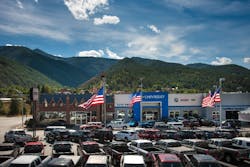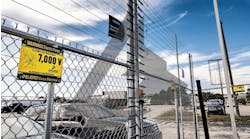When Dave Smith Motors—a leading Dodge-Chrysler-Jeep-Ram dealership in Kellogg, Idaho—added its own body shop six years ago, it could have been a disaster.
Fortunately, several good management and communication practices had been put in place. In particular, the shop’s thriving parts sales translated directly to a seamless process between the parts department and the shop’s technicians.
And you can thank Crete Colby for that.
“On top of my communication with body shops across the country buying parts from us, I’m talking to our own technicians daily,” says Colby, who has been the parts director for David Smith Motors in Kellogg, Idaho, for 10 years. “We have to have open communication all of the time for this to work.”
And when it comes to improving that communication process with technicians and managers, Colby is combining his experience as a parts salesman with his ability to think outside the box to establish new ways of making the repair process easier at his own dealership and shops around the country.
I have about 20 people under me in the parts department, including shipping and receiving parts. I have three wholesale guys that do nothing but dedicated wholesale. Then I have three other people that handle overflow calls. I’ve broken everybody into little groups. I’ve got my wholesale, my back counter, some retail.
DAVE SMITH MOTORS
LOCATION
KELLOGG, IDAHO
SIZE
30,000 SQUARE FEET
PARTS DEPARTMENT STAFF:
20
BODY SHOP STAFF:
7 (4 TECHNICIANS, 2 ADMINISTRATIVE, 1 MANAGER)
AVERAGE MONTHLY CAR COUNT
40
ANNUAL REVENUE
$12 MILLION (PARTS AND COLLISION)
My crew started out a lot smaller, and it’s just grown and grown. The previous manager started it on that track. I’ve never had an original idea. I steal other people’s good ideas and make them work for us. We belong to the Mopar Masters Guild, which is sort of like a 20 Group. We go to those meetings, and all those guys provide great insight. If their ideas don’t completely work for us, we’ll use part of that idea and part of another idea to make it work for us. That’s how we’ve been able to grow our parts department into what it is today.
I manage each one of those separately because each one is its own little business. The back counter guys wouldn’t work well with the body shop people. It’s a whole different business. They’re not the same kind of technicians, they don’t communicate the same, they don’t use the same verbiage. My wholesale guys have talked to technicians their whole careers. With the techs, we can go out to the body shop, walk through, ask if there’s anything they need, if we can do anything to make the process better for them. I gave all my wholesale guys their own dedicated phone line, so shops can call straight to the guy they’re comfortable with and make orders more cohesive.
I’m always the first one at the office each day, opening up shop. The first thing I do each day is walk through the department and try to find tasks that weren’t accomplished the day before. It could be as simple as a shipment that didn’t get unpacked. Since we have such good communication at the shop, I have a pretty good grasp on what my guys are doing and what they’re selling.
Then I go back to my desk and read a long list emails, probably 150 a day. I focus on our main customers, our big buyers, answer the ones that need answering. I then go over the Chrysler order and what will come into stock, what won’t. Then do the same thing through GM. That all takes a bit of time, and by the end, I’ve got guys coming in to work in the different areas.
Throughout the day, I’m in contact with the body shop and dealership owners. I have to keep them in the loop about parts we have in stock, parts on backorder, how sales are doing. Every day I’m setting up meetings to keep them informed. Right now we’re dealing with a recall issue, and they want to know every detail about that and what we’re doing about it.
I believe communication is the root of all evil … only because people don’t understand how to communicate. Without the proper communication between us and other body shops—including our own—nobody knows anything. That’s why I’m always looking for different ways of communicating better, using different programs to make everybody’s lives easier. CollisionLink helps us out a lot—so many shops are using it these days. It allows me to match the estimates on just about every repair.
Don’t get me wrong—things can get messy. I think there’s animosity between parts departments and technicians at most body shops. That’s part of the dealership mentality I had to break out of: “We’re the parts department—we’re in here, you’re out there. It’s us against everybody else.” We think more globally. If we’re going to do something that is going to hurt the body shop, we don’t do it. It’s about thinking about the health of the dealership and not just the health of the parts department.
It’s about how we react to an issue. We were starting to see an issue with not having the right parts in stock when they were needed for repairs, so now we stock parts in advance for our body shop. Instead of waiting for a part to have three sales, we just order extra right away, betting the technician knows what he’s doing and putting us way ahead of the game.
Price matching has been a huge learning curve for our department, but it’s also made us extremely successful with body shops. We can’t always match every price, but what we’ve done is we’ve adjusted prices on other parts. So say the bottom line is they have $1,000 to spend on parts. If I can make the transaction stay at $1,000, they’ll still buy my parts. If I can’t negotiate and come down to a certain price, I’ll find a way to give them a discount on these four other pieces and keep the bottom line the same. We do anything we can to keep the sale.
Body shops always want to buy our parts, but sometimes they get tied into insurance companies that don’t let them and tell them to buy the cheapest thing. If they’re only going to pay X amount, and if I can get them factory parts that fit perfectly the first time, everybody is way ahead and can make more business. I have to try and make their business succeed. If I can make them succeed, they’ll bring me with them and then I’ll succeed more.
It gives the parts department a whole cohesive feel when you have a dedicated parts director. I steer this big steamship. I set the direction for where we want to go, and how we want to get there. I do that through our parts sales, and through helping to make our own body shop successful.
I’m able to do all of this because I had a really good teacher. I wouldn’t be who I am right now without the guy I took the job from. He taught me to never be afraid to do something. Don’t be afraid to try it. Don’t get stuck in the regular dealer mentality of, “This is what we’re supposed to do.”
I’ve got parts spread out all over town. We’re a small dealership. We’ve probably got 2,000 cars on the ground at any one time. There’s nothing in the same area. Some parts are upstairs, some are down by shipping. I’ve got a huge loading dock that can take a semi, plus a couple other trucks. I’ve got a tire store in another town, a used car shop in another. It’s a wide area, so I’m driving a lot.
What the former parts director taught me was to manage by walking around. Don’t be stuck in your office. Be out where people can see you. I’ve got a little pedometer on my phone, and it says I walk about 5.5 miles a day just here at work. I never have to wait until our monthly parts meeting to find out about a problem. If there’s an issue, we can handle it right that second instead of waiting for a month.



